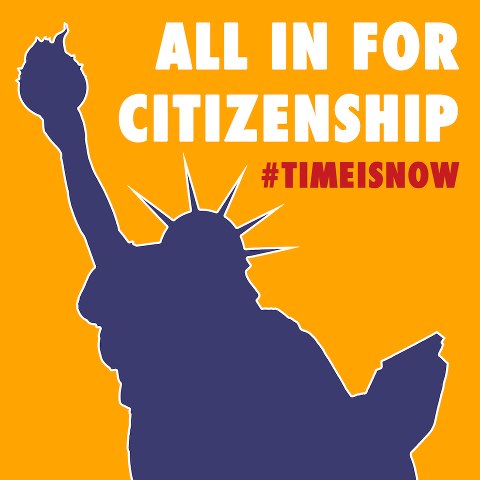Full disclosure, I’m a Dreamer. I’m also a full-time third-year law student. I work at an immigration law firm in Metropolitan Washington D.C. and I love my job.
Like many immigrants in the United States, my family and I were screwed over by immigration lawyers and school administrators, which left me without legal status in the United States. As such, I have an inherent dislike of immigration lawyers as there are many bad ones in the profession. At the same time, I’ve had the pleasure of knowing some really great immigration lawyers who’ve helped me out on innumerable occasions.
As such, I have to come out strong against several politicians and non-profits who are spreading the dangerous and irresponsible messaging that Dreamers do not need lawyers for the new deferred action process starting on August 15. I’d strongly advise my fellow Dreamers to get a competent immigration attorney to draw them an immigration history chart to ascertain precisely what benefits they could be eligible for now and in the near future. Not doing so, would be highly irresponsible. Laura Lichter, President of the American Immigration Lawyer’s Association (AILA) does a great job of telling us why we need lawyers, but I have a few more reasons to add.
First, since June 15 2012, dozens of Dreamers have walked into our immigration law firm. Close to half of them actually qualify for better relief than deferred action. We’ve had lawful permanent residents consult with us not knowing they were in fact, lawful permanent residents. We’ve had cases of people who would not qualify for deferred action but are eligible for special immigrant juvenile status, and hence, a green card. We’ve had cases of people who’ve been victims of serious crimes and persecution, who would qualify for asylum and withholding in the U.S., and some who would qualify for U-Visas. We even had a case of a Dreamer who was actually a U.S. citizen because his dad had naturalized as a minor — he just did not know that he automatically became a U.S. citizen. And we’ve many Dreamers, including myself, who are eligible for green-cards through non-LPR cancellation of removal in immigration court.
Now most Dreamers are probably just eligible for deferred action. However, I don’t think it hurts to see an immigration lawyer, especially if you may be eligible to adjust your status to that of a lawful permanent resident. It also does not hurt to see an immigration attorney especially if you have crimes or convictions on your record. Sometimes, a lawyer can get you post-conviction relief, and USCIS will most likely honor that.
Second, in most cases, local non-profits do not have the legal expertise to answer tough legal immigration questions regarding legal terms like continuous presence, unlawful presence, advance parole in individual cases. For the most part, they have never actually practiced immigration law. Legal help provided at workshops or clinics is often cursory and you need an immigration lawyer to devote more than 30 minutes to your case. Besides lack of legal expertise, there is also no way that non-profits can accommodate 1.76 million applicants. In such cases, private immigration attorneys are crucial for Dreamers to get expert advise and help.
Third, not all Dreamers are college-educated with the inherent ability to fill out immigration forms (and even college-educated Dreamers make mistakes). We could fill out forms incorrectly, which could get us a denial notice, with no appeal process. In some cases, checking the wrong box could result in a notice to appear in immigration court proceedings. For the most part, we all have only one shot at doing this right. We may as well make sure that several people look at our application before it is filed and that we have strong and highly experienced advocates to follow-up with USCIS if anything goes wrong.
And finally, regardless of what USCIS says about keeping your information private and confidential, experienced immigration professionals know that ICE will not hesitate to use your information against you if they ever initiate removal proceedings. We are talking about an agency and administration that has deported more people than ever before. During conference calls with USCIS, Director Mayorkas has made it clear that those with potentially negative immigration histories, including fraud and crimes, would be referred to ICE for removal proceedings. I don’t want to discourage anyone from applying by sounding an alarm — but this is not the easy, benevolent process that some people are painting it to be.
Application fees are $465. Reasonable private immigration attorney costs should be in the range of $500-$2000, not counting any fees and depending on the complexity of the case. Immigration attorneys would need to open your files, input your information into the system, ascertain what benefits you are eligible for, get their paralegals fill several forms for you, get certified copies of your court records in some cases, gather several hundred pages of documents proving your identity and proof of presence, make copies and send them in for you. They would need to follow-up with USCIS for any notice to deny or request for further evidence. All of this requires significant time and effort, even in the most compelling cases.
It is worth your pesos to make sure that your case is handled by competent professionals and not those who may not have the legal expertise that is required to handle your case or tell you that you actually qualify for more than just deferred action. Do yourself a favor and get yourself the best advocate you can afford. It will be well worth it. If you truly can not afford a private lawyer, remember that some of the best immigration attorneys are not at firms, but at non-profits that dedicate the time and resources to running a first-class immigration shop.
Tags: AILA, deferred action, Dream Act, dreamers, uscis

 In Artesia, Elanie represented detained women and children refugees seeking protection from the domestic and gang violence they had fled in Central America. It is in that setting in which BR Partner Dree Collopy met Elanie and was immediately impressed by her skills as an attorney and passion as an advocate for justice. Through her work in Artesia, Elanie won asylum for a woman and her young son from Honduras, who had fled years of horrific domestic violence. Applying her client’s compelling story to the legal minefield of gender-based and particular social group asylum claims, Elanie convinced an immigration judge that her client and her client’s young son merited protection in this country. Upon being granted asylum, Elanie’s clients were released from the horrific conditions in Artesia, the Obama Administration’s detention center that has now been shut down in shame. Living freely and safely in the United States, Elanie’s clients still send her nearly-daily messages of gratitude for her selfless devotion to their cause.
In Artesia, Elanie represented detained women and children refugees seeking protection from the domestic and gang violence they had fled in Central America. It is in that setting in which BR Partner Dree Collopy met Elanie and was immediately impressed by her skills as an attorney and passion as an advocate for justice. Through her work in Artesia, Elanie won asylum for a woman and her young son from Honduras, who had fled years of horrific domestic violence. Applying her client’s compelling story to the legal minefield of gender-based and particular social group asylum claims, Elanie convinced an immigration judge that her client and her client’s young son merited protection in this country. Upon being granted asylum, Elanie’s clients were released from the horrific conditions in Artesia, the Obama Administration’s detention center that has now been shut down in shame. Living freely and safely in the United States, Elanie’s clients still send her nearly-daily messages of gratitude for her selfless devotion to their cause.




